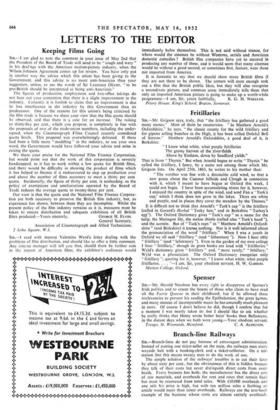LETTERS TO THE EDITOR
Keeping Films Going
SIR,—I am glad to note the comment in your,issue of May 2nd that the President of the Board of Trade will need to be "tough and wary" in his deaFrigs with the American motion-picture industry, when the Wilson/Johnson Agreement comes up for review. You have only put in another way the advice which this union has been giving to the Government, and this advice is no more anti-American than your suggestion, unless, to use the words of Sir Laurence Olivier, "to be pro-British should be interpreted as being anti-American."
The figures of production, employment and box-office takings do not bear out your contention that there is a slight improvement in the industry. Certainly it is foolish to claim that an improvement is due to less interference in the industry by this Government than its predecessor. One of the reasons for this union's being criticised by the film trade is because we share your view that the film quota should be observed, and that there is a case for an increase. The raising to thirty-five per cent., which you propose, is completely in line with the proposals of two of the trade-union members, including the under- signed, when the Cinematograph Films Council recently considered quota levels. This proposal was overwhelmingly defeated. If there had been a little more " meddling " in the industry, to use your own word, the Government would have followed your advice and mine in raising the quota.
We share your praise for the National Film Finance Corporation, but would point out that the work of this corporation is severely handicapped, as it has to work within a low quota for British films, and there would be difficulty in showing the product of films which it has helped to finance if it endeavoured to step up production over and above the number of films necessary to meet a thirty per cent quota. Incidentally, the figure of thirty per cent, is misleading, as the policy of exemptions and ameliorations operated by the Board of Trade reduces the average quota to twenty-three per cent.
Our view is that the quota and the National Film Finance Corpora- tion are both necessary to preserve the British film industry, but, as experience, has shown, between them they are incomplete. Whilst the present policy of the film industry remains as it is, measures must be taken to ensure distribution and adequate exhibition of all British
films produced.—Yours sincerely, GEORGE H. ELVIN. General Secretary, Association of Cinematograph and Allied Technicians. 2 Soho Square. W.I.


































 Previous page
Previous page